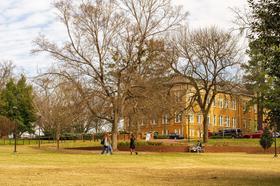Serving 523 students in grades Prekindergarten-4, Madison Elementary School ranks in the top 30% of all schools in Kansas for overall test scores (math proficiency is top 30%, and reading proficiency is top 30%).
The percentage of students achieving proficiency in math is 45-49% (which is higher than the Kansas state average of 31%). The percentage of students achieving proficiency in reading/language arts is 40-44% (which is higher than the Kansas state average of 32%).
The student-teacher ratio of 15:1 is higher than the Kansas state level of 13:1.
Minority enrollment is 24% of the student body (majority Hispanic), which is lower than the Kansas state average of 39% (majority Hispanic).
Quick Facts (2026)
- Grades: Prekindergarten-4
- Enrollment: 523 students
- Student-Teacher Ratio: 15:1
- Minority Enrollment: 24%
- Overall Testing Rank: Top 30% in KS
- Math Proficiency: 45-49% (Top 30%)
- Reading Proficiency: 40-44% (Top 30%)
- Source: National Center for Education Statistics (NCES), KS Dept. of Education
School Overview
Madison Elementary School's student population of 523 students has grown by 5% over five school years.
The teacher population of 35 teachers has declined by 7% over five school years.
Grades Offered
Grades Prekindergarten-4
(No virtual instruction)
(No virtual instruction)
Total Students
523 students
Gender %
Total Classroom Teachers
35 teachers
School Calendar
Last Day of School
Mon. May 25, 2026
School Rankings
Madison Elementary School ranks within the top 30% of all 1,269 schools in Kansas (based off of combined math and reading proficiency testing data).
The diversity score of Madison Elementary School is 0.41, which is less than the diversity score at state average of 0.57. The school's diversity has stayed relatively flat over five school years.
Overall Testing Rank
#286 out of 1269 schools
(Top 30%)
(Top 30%)
Math Test Scores (% Proficient)
45-49%
31%
Reading/Language Arts Test Scores (% Proficient)
40-44%
32%
Student-Teacher Ratio
15:1
13:1
American Indian
n/a
1%
Asian
2%
3%
Hispanic
8%
22%
Black
5%
7%
White
76%
61%
Hawaiian
n/a
n/a
Two or more races
9%
6%
All Ethnic Groups
Participates in the National School Lunch Program (NSLP)
Yes
Eligible for Free Lunch
26%
42%
Eligible for Reduced Lunch
6%
7%
School Statewide Testing
School District Name
Source: National Center for Education Statistics (NCES), KS Dept. of Education
Profile last updated: 02/09/2025
Frequently Asked Questions
What is Madison Elementary School's ranking?
Madison Elementary School is ranked #286 out of 1,269 schools, which ranks it among the top 30% of public schools in Kansas.
What schools are Madison Elementary School often compared to?
Madison Elementary Schoolis often viewed alongside schools like Moonlight Elementary School by visitors of our site.
What percent of students have achieved state testing proficiency in math and reading?
45-49% of students have achieved math proficiency (compared to the 31% KS state average), while 40-44% of students have achieved reading proficiency (compared to the 32% KS state average).
How many students attend Madison Elementary School?
523 students attend Madison Elementary School.
What is the racial composition of the student body?
76% of Madison Elementary School students are White, 9% of students are Two or more races, 8% of students are Hispanic, 5% of students are Black, and 2% of students are Asian.
What is the student-teacher ratio of Madison Elementary School?
Madison Elementary School has a student ration of 15:1, which is higher than the Kansas state average of 13:1.
What grades does Madison Elementary School offer ?
Madison Elementary School offers enrollment in grades Prekindergarten-4 (No virtual instruction).
What school district is Madison Elementary School part of?
Madison Elementary School is part of Gardner Edgerton School District.
School Reviews
Review Madison Elementary School. Reviews should be a few sentences in length. Please include any comments on:
- Quality of academic programs, teachers, and facilities
- Availability of music, art, sports and other extracurricular activities
Recent Articles

Public School Transportation & Commute Planning Guide
Learn how public school transportation and commute planning can help families prepare for the coming school year safely and efficiently.

New Public School Safety Protocols 2025–26 Guide
Learn how new public school safety protocols for 2025–26 affect students, parents, and schools nationwide.

How Technology Transforms Education in 2025
Explore how technology shapes learning today, with updated data, policy context, trends, and real-world implications for students, educators, and families.





